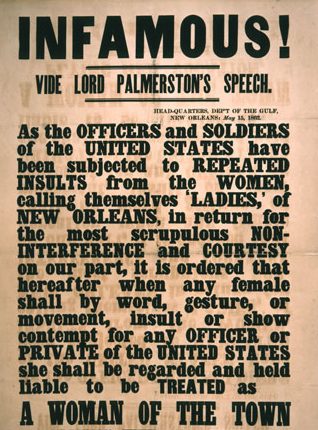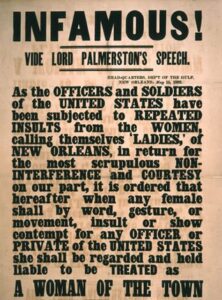Clara Solomon
Clara Solomon is best known for her diary, which chronicles her experiences in New Orleans during the Civil War.

Courtesy of The Historic New Orleans Collection
Infamous! Vide Lord Palmerston's speech. Butler, Benjamin F. (Author)
Clara Solomon is best known for her diary, which chronicles her experiences during the Civil War. Only sixteen when the war begins, she writes from the perspective of a relatively wealthy Jewish Confederate. Written between June 1861 and July 1862, Solomon’s journal reveals her anxieties about the future, frustration with wartime shortages, and anger at the Union during the federal occupation of New Orleans.
Clara Solomon was born ca. 1845, the second of six surviving daughters born to merchant Solomon P. Solomon and his wife, Emma Solomon. She was raised as a member of the small but influential Sephardic Jewish community in New Orleans, and attended the Louisiana Normal School in New Orleans with the intention of teaching upon her graduation. With the coming of Civil War, however, Solomon Solomon relocated his business to Virginia, where he worked as a sutler, supplying clothing and equipment to the Confederate Army.
In New Orleans, Clara wrote about the difficulties resulting from her father’s absence, which were compounded by Union occupation of the city beginning in April 1862. As the Union blockade tightened its grip on New Orleans, irregular contact with Solomon placed Clara and her family in financial difficulty. Often reliant on the kindness of friends for food and supplies, the Solomon women were forced to take in paid sewing for the soldiers in an effort to make ends meet. In a wartime economy of scarcity, Clara also realized that she had sacrificed her youth for the Confederate cause. Wearing patched and remodeled clothes with resentment, she wrote of her hatred for her captors.
While Clara concluded that public patriotism should be tempered by propriety, she used her diary to record her anger about the repercussions of federal occupation, including the censorship of the city’s newspapers and confiscation of books and teaching materials from her school. She also expressed ire at the introduction of Gen. Benjamin Butler’s infamous General Order No. 28. The so-called the “Woman Act” decreed that any woman showing contempt of a Union soldier could be treated as a prostitute.
Despite the war, Clara Solomon completed her schooling, and in April 1866, she married Julius Lilienthal, a merchant twenty years her senior. Lilienthal died in 1867, and Clara married Dr. George Lawrence in 1872. The couple had four daughters. Clara Solomon Lilienthal Lawrence died in New Orleans in 1907. Her edited journal was published in 1998 as The Civil War Diary of Clara Solomon: Growing Up in New Orleans 1861–1862.
